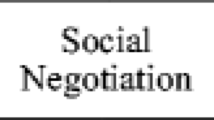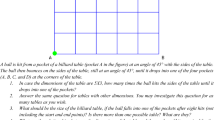Abstract
The purpose of this study is to contribute insights into how collaborative activity can help promote students’ mathematical understanding. A group of six high school students (15- to 16-year olds) worked together on a challenging probability task as part of a larger, after-school, longitudinal study on students’ development of mathematical ideas in problem-solving settings. The students solved the problem and produced a valid justification of their solution. This study shows that collaborative activity can help promote students’ mathematical understanding by providing opportunities for students to critically reexamine how they make claims from facts and also enable them to build on one another’s ideas to construct more sophisticated ways of reasoning. Implications for classroom teaching and ideas for future research are also discussed. The study helps address a documented need for a better understanding of how mathematical learning evolves in social settings.



Similar content being viewed by others
Notes
The longitudinal study was supported, in part, by National Science Foundation grant REC-0309062 (directed by C. A. Maher). The opinions expressed are not necessarily of the sponsoring agency and no endorsement should be inferred. The authors were part of the research team.
References
Balacheff, N. (1991). Benefits and limits of social interaction: The case of mathematical proof. In A. Bishop, S. Mellin-Olsen, & J. van Dormolen (Eds.), Mathematical knowledge: Its growth through teaching (pp. 175–192). Dordrecht: Kluwer.
Bauersfeld, H. (1995). The structuring of structures: Development and function of mathematizing as a social practice. In L. P. Steffe & J. Galle (Eds.), Constructivism in education (pp. 137–158). Hillsdale: Lawrence Erlbaum Associates.
Boero, P., & Guala, E. (2008). Development of mathematical knowledge and beliefs of teachers. In P. Sullivan & T. Wood (Eds.), International handbook of mathematics teacher education (pp. 223–244). Rotterdam: Sense Publishers.
Bowers, J. S., & Nickerson, S. (1991). Identifying cyclic patterns of interaction to study individual and collective learning. Mathematical Thinking and Learning, 3, 1–28.
Cobb, P. (1999). Individual and collective mathematical development: The case of statistical data analysis. Mathematical Thinking and Learning, 1, 5–43.
Cobb, P., Boufi, A., McClain, K., & Whitenack, J. (1997). Reflective discourse and collective reflection. Journal for Research in Mathematics Education, 28(3), 258–277.
Cobb, P., & Yackel, E. (1996). Constructivist, emergent, and sociocultural perspectives in the context of developmental research. Educational Psychologist, 31(3/4), 175–190.
Davis, B., & Simmt, E. (2003). Understanding learning systems: Mathematics education and complexity science. Journal for Research in Mathematics Education, 34, 137–167.
Davis, R. B., & Maher, C. A. (1990). The nature of mathematics: What do we do when we “do mathematics”? In R. B. Davis, C. A. Maher, & N. Noddings (Eds.), Constructivist views on the teaching and learning of mathematics (pp. 65–78). Reston: National Council of Teachers of Mathematics.
Dörfler, W. (2000). Means for meaning. In P. Cobb, E. Yackel, & K. McClain (Eds.), Symbolizing and communicating in mathematics classrooms: Perspectives on discourse, tools, and instructional design (pp. 99–131). Mahwah: Lawrence Erlbaum Associates.
Krummheuer, G. (1995). The ethnography of argumentation. In P. Cobb & H. Bauersfeld (Eds.), The emergence of mathematical meaning: Interaction in classroom cultures (pp. 229–269). Hillsdale: Lawrence Erlbaum Associates.
Lampert, M., & Cobb, P. (2003). Communication and language. In J. Kilpatrick, G. Martin, & D. Schifter (Eds.), A research companion to principles and standards for school mathematics (pp. 237–248). Reston: National Council of Teachers of Mathematics.
Lampert, M., Rittenhouse, P., & Crumbaugh, C. (1998). Agreeing to disagree: Developing sociable mathematical discourse. In D. R. Olson & N. Torrance (Eds.), Handbook of education and human development. Oxford: Blackwell.
Lave, J. (1997). The culture of acquisition and the practice of understanding. In D. Kirshner & J. Whitson (Eds.), Situated cognition: Social, semiotic, and psychological perspectives (pp. 17–35). Mahwah: Lawrence Erlbaum Associates.
Lave, J., & Wenger, E. (1991). Situated learning: Legitimate peripheral participation. Cambridge: Cambridge University Press.
Maher, C. A., & Martino, A. M. (1996). The development of the idea of mathematical proof: A 5-year case study. Journal for Research in Mathematics Education, 27(2), 194–214.
Manouchehri, A., & Enderson, M. (1999). Promoting mathematical discourse: Learning from classroom examples. Mathematics Teaching in the Middle School, 4, 216–222.
Martin, L., Towers, J., & Pirie, S. (2006). Collective mathematical understanding as improvisation. Mathematical Thinking and Learning, 8(2), 149–183.
McCrone, S. S. (2005). The development of mathematical discussion: An investigation in a fifth-grade classroom. Mathematical Thinking and Learning, 7(2), 111–133.
NCTM. (2000). Principles and standards for school mathematics. Reston: National Council of Teachers of Mathematics.
Pedemonte, B. (2007). How can the relationship between argumentation and proof be analysed? Educational Studies in Mathematics, 66, 23–41.
Powell, A. B., Francisco, J. M., & Maher, C. A. (2003). An evolving analytical model for understanding the development of mathematical thinking using videotape data. The Journal of Mathematical Behavior, 22(4), 405–435.
Rasmussen, C., & Stephan, M. (2008). A methodology for documenting collective activity. In A. E. Kelly & R. Lesh (Eds.), Design research in education (pp. 195–215). Mahwah: Lawrence Erlbaum Associates.
Roschelle, J., & Teasley, S. D. (1995). The construction of shared knowledge in collaborative problem solving. In C. E. O’Malley (Ed.), Computer supported collaborative learning (pp. 88–110). Berlin: Springer.
Salomon, G. (1993). No distribution without individuals’ cognition dynamic interactional view. In G. Salomon (Ed.), Distributed cognitions (pp. 111–138). Cambridge: Cambridge University Press.
Sawyer, R. K. (2001). Creating conversations: Improvisation in everyday discourse. Cresskill: Hampton Press.
Saxe, G. (2002). Children’s developing mathematics in collective practices: A framework for analysis. The Journal of the Learning Sciences, 11, 275–300.
Schoenfeld, A. (1985). Mathematical problem solving. San Diego: Academic.
Sfard, A. (2001). There is more to discourse than meets the ears: Looking at thinking as communicating to learn more about mathematical learning. Educational Studies in Mathematics, 46, 13–57.
Sfard, A., & Kieran, C. (2001). Cognition as communication: Rethinking learning by talking through multi-faceted analysis of students’ mathematical interactions. Mind, Culture, and Activity, 8, 42–76.
Shaughnessy, M. J. (2003). Research on students’ understanding of probability. In J. Kilpatrick, G. Martin, & D. Schifter (Eds.), A research companion to principles and standards for school mathematics (pp. 216–225). Reston: NCTM.
Simon, M. (1995). Reconstructing mathematics pedagogy from a constructivist perspective. Journal for Research in Mathematics Education, 26, 114–145.
Stephan, M., Cobb, P., & Gravemeijer, K. (2003). Coordinating social and individual analyses: Learning as participation in mathematical practices. Supporting students’ development of measuring conceptions: Analyzing students’ learning in social context. Monograph of the Journal for Research in Mathematics Education, 12, 67–102.
Stephan, M., & Rasmussen, C. (2002). Classroom mathematical practices in differential equations. The Journal of Mathematical Behavior, 21, 459–490.
Toulmin, S. (1969). The uses of arguments. Cambridge: Cambridge University Press.
Vygotsky, L. S. (1978). Mind and society. Cambridge: Harvard University Press.
Weber, K., & Alcock, L. (2005). Using warranted implications to understand and validate proofs. For the Learning of Mathematics, 25, 34–38.
Weber, K., Maher, C., Powell, A., & Lee, H. (2008). Learning opportunities from group discussions: Warrants become the objects of debate. Educational Studies in Mathematics, 68(32), 247–261.
Yackel, E. (2001). Explanation, justification, and argumentation in mathematics classrooms. In M. van den Heuvel-Panhuizen (Ed.), Proceedings of the 25th Conference for the International Group of Psychology of Mathematics Education (1, 9–24). Utrecht, the Netherlands.
Yackel, E., & Cobb, P. (1996). Sociomathematical norms, argumentation, and autonomy in mathematics. Journal for Research in Mathematics Education, 27, 458–477.
Author information
Authors and Affiliations
Corresponding author
Rights and permissions
About this article
Cite this article
Francisco, J.M. Learning in collaborative settings: students building on each other’s ideas to promote their mathematical understanding. Educ Stud Math 82, 417–438 (2013). https://doi.org/10.1007/s10649-012-9437-3
Published:
Issue Date:
DOI: https://doi.org/10.1007/s10649-012-9437-3




